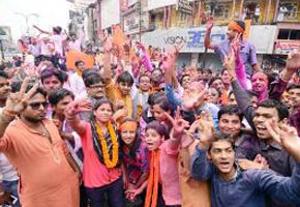New Delhi, Sep 13: After a gap of 18 years, BJP's student wing Akhil Bhartiya Vidyarthi Parishad today swept Delhi University students' union elections, trouncing Congress' NSUI to bag all four positions and credited the triumph to "Modi wave".
 The ABVP won posts of president, vice president, secretary and joint secretary by comfortable margins, bettering last year's performance when it had lost one of the seats to the National Students' Union of India (NSUI).
The ABVP won posts of president, vice president, secretary and joint secretary by comfortable margins, bettering last year's performance when it had lost one of the seats to the National Students' Union of India (NSUI).
Mohit Nagar was elected president of DUSU while Pravesh Malik won the elections for vice president's post. Kanika Shekhawat and Ashutosh Mathur have been elected as secretary and joint secretary respectively.
Chief Election Officer for the DUSU polls DS Rawat said Nagar polled 20,718 votes defeating Gaurav Tushir of NSUI who polled 19,804 votes for the post of president. The margin of defeat was 914.
Last year ABVP had won the posts of president, vice-president and joint secretary while NSUI had managed to capture only secretary's post.
"Expectations of people have gone up after Modi government came to power. The ABVP fulfilled its promises of scrapping the four-year undergraduate (FYUP) programme. We won because of the Modi wave," said Rohit Chahal, National Secretary, ABVP.
BJP national president Amit Shah took to twitter to congratulate ABVP on their victory.
"I congratulate ABVP for winning all 4 panels in DUSU elections. The students & karyakartas of DU deserve the credit," he tweeted.
Parvesh Malik, who polled 21,935 votes, defeated NSUI's candidate Mona Chodhary with the margin of 7,859 votes. Chodhary got 15,649 votes, Rawat said.
He said Shekhawat defeated NSUI's Amit Sidhu Teema by 3022 votes. Shekhawat polled 18,671 votes while Teema polled 15,649 votes.
ABVP joint secretary candidate Ashutosh Mathur polled 23,133 votes while NSUI's Abhishek Choudhary got only 12,065 votes. Mathur defeated Choudhary by 11,068 votes, which is the highest margin among all the winning candidates.






Comments
Add new comment